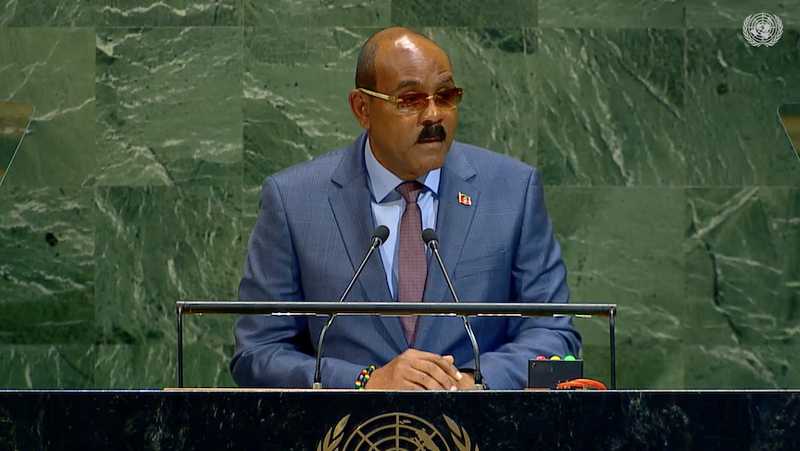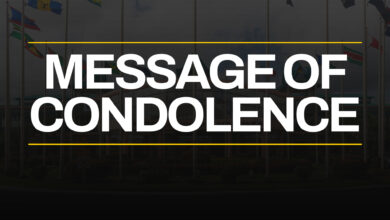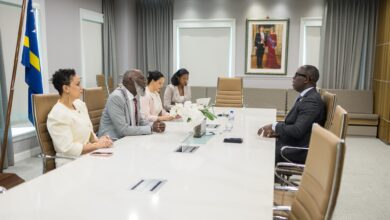(CARICOM Secretariat, Turkeyen, Greater Georgetown, Guyana) – Heads of Government of the Caribbean Community (CARICOM) made a compelling case for peace, security, multilateralism, and action to address the unique challenges facing Small Island Developing States (SIDS) during the General Debate of the 80th Session of the United Nations General Assembly, in New York.
“Without international cooperation, universal peace will not be achieved,” Prime Minister Gaston Browne of Antigua and Barbuda said in his address to world leaders.
He emphasised that the climate crisis is not just a weather forecast for small island states, but a daily reality marked by retreating shorelines, bleaching reefs, intensifying storms, and droughts that devastate crops and livestock.
“This is not fate; science has proven that it is the product of sustained high emissions,” he said, calling for a just and orderly energy transition that caps, then fairly phases down and ultimately phases out the fuels which drive the climate crisis.
In her address Barbados Prime Minister, The Hon. Mia Mottley warned of a growing “crisis of truth” that is eroding both national and global institutions that have long upheld peace, order and prosperity. She called for a long-term support plan addressing security and development in Haiti, and urgent action to halt the genocidal destruction in Gaza and the humanitarian crisis in El Fasher, Sudan.
A sobering historical reminder on the formation of the United Nations came from the Prime Minister of The Bahamas, The Rt. Hon. Philip Davis. “The United Nations was not born out of some high-minded ideal…the UN was created out of the ashes of a period when humanity had almost destroyed itself,” he said.
“We are in danger of being doomed to repeat the brutal lessons of history. When nations go their separate ways, history teaches us that disaster eventually follows.”
Belize’s Prime Minister, The Hon. John Briceno, described the UN as “fulfilling its mandate as a beacon of hope, a defender of dignity and freedom,” but bemoaned the constraints that prevented it from fulfilling its mandate.
He pointed to escalating conflicts involving major nuclear powers in Asia, Europe and the Middle East, and the humanitarian toll of man-made conflicts in Sudan, Gaza and Haiti. “This should compel us to act,” he said, “yet the UN is actively blocked from doing its job.”
In a stark warning, President of the Commonwealth of Dominica, Her Excellency Sylvanie Burton, said if the UN does not address the widening global disparities between nations at the forefront of progress and those mired in poverty, conflict, and climate vulnerability, it risks “writing its own catastrophe.”
Grenada’s Prime Minister, The Hon. Dickon Mitchell, spoke on behalf of the world’s children, highlighting the devastating impact of war on education.
“In one corner of the world, classrooms are reduced to rubble. In another, laboratories create breakthroughs in science and technology that can transform our future,” he said.
“Whether in Palestine, Haiti, Sudan, or Ukraine, a child’s right to learn is sacred as the right to life itself,” he added, urging world leaders to ensure that “no classroom is traded for a battlefield.”
President of the Presidential Council of the Transition of Haiti. H.E. Anthony Franck Laurent Saint Cyr made an impassioned plea for international solidarity and support for peace and stability in his country.
“Haiti wants peace. Haiti expects peace. Haiti has the right to peace,” he declared, calling for decisive action against criminal elements seeking to impose violence as a social order.
Prime Minister of St. Kitts and Nevis, The Hon. Dr Terrance Drew, underscored the existential threat of climate change, describing the anguish of fishermen who watch coral reefs disappear “until there is nothing left to catch but memories.”
“These are not metaphors for us; these are our fears at the turn of every hurricane season,” he said, calling out industrialised nations as the primary contributors to global emissions. He also welcomed the International Court of Justice’s landmark ruling on state accountability for climate change.
St. Vincent and the Grenadines Prime Minister Dr The Hon. Ralph Gonsalves warned against the destabilising actions of “imperial powers and rising hegemons” that undermine multilateralism.
He urged support for the Bridgetown Initiative 3.0, led by Prime Minister Mia Mottley of Barbados and endorsed by CARICOM, which outlines clear proposals for climate and development financing.
Trinidad and Tobago’s Prime Minister, the Hon. Kamala Persad-Bissessar, focused her address on the threats of transnational crime and narco-trafficking.
“The global drug economy destabilises institutions, corrodes democracy, and undermines development. It is a war without borders, measured in murdered children, broken families, and stolen futures,” she said, expressing her country’s readiness to join an alliance to combat this scourge.
Read other stories emanating from CARICOM Heads of Government’s interventions during the 80th Session of the General Assembly by clicking the links below:






